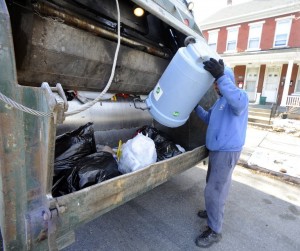Conventional wisdom holds the universal truth that littered cigarette butts are unsightly; an undesirable side effect of a habit which most smokers wish they could drop. But while many smokers may not be successful in dropping their habit, they are far too successful at dropping their cigarette butts in the streets. According to Litter Free Planet, a nonprofit anti-litter organization, 4.5 trillion cigarette butts are littered worldwide annually, accounting for 75% of the 6 trillion sold. Keep America Beautiful, another anti-litter educational group, reports that cigarette butts account for an estimated 38% of litter in the United States, and states, counties, and municipalities spend a collective $1.3 billion on litter abatement annually. Another $9 billion and $241 million annually is spent by private businesses and educational institutions, respectively. If the cost of cigarette litter abatement is proportional to the percentage of the litter which it comprises, then cigarette butt litter clean-up costs the United States $4 billion per year. And this is just the direct cost. Additional costs are born in forest fires ignited by improper disposal of lit cigarettes, decreased property values in littered neighborhoods, and lost tourism revenues in regions with littered roadsides or in coastal town beaches mistaken for ashtrays.
Category: Waste Management (Page 2 of 2)
As the Assistant Program Manager at the UNC Environmental Finance Center (EFC), I work ‘behind the scenes’ on internal projects related to the every day management of our center. In my role facilitating organizational development at the EFC, I recently spent time researching project management best practices. At the EFC, we help communities design, implement, and finance sustainable environmental projects and programs, and not surprisingly, strong project management structure is often a critical component of any sustainable program. While some of this research was specific to the EFC, many of the lessons I discovered are broadly applicable, whether you’re working for a small water utility or a statewide initiative. Through this post, I would like to share four easy steps to streamlined project management for any size project.
The intersection between public finance and environmental sustainability is a complex and often challenging space. However, where there are challenges, there are also opportunities. Projects and initiatives that link together public finance and environmental sustainability can be found at any scale – at the organizational, local, regional, state, or national level – and in any environmental context; water, sewer, energy, land conservation, solid waste management, etc. Increased focus on environmental sustainability has led to dramatic transformations at all levels of private sector, institutional, and governmental operations that have important finance implications. Facilities are being built that use far less resources. Distributed renewable energy is becoming a viable alternative energy option. Private businesses, universities, local governments, and state governments are making investments that reduce the environmental impact of their operations.
New financial instruments, for example green bonds, are providing borrowers and investors with new choices. These developments often have significant financial implications related to who pays, how much they pay, and how they pay for essential services and products.
By Sarah Royster and Mary Sketch
The Environmental Finance Center analyzes annual data from multiple sources, including the NC Division of Environmental Assistance and the NC Division of Waste Management, on solid waste fees from North Carolina counties and municipalities. Using surveys from various government commissions on solid waste charges per household or resident, this data was combined with annual census data to reveal several interesting trends. Continue reading

Solid Waste Finance: Controlling Costs Through Innovative Waste Management and Reduction Programs
Lexi Kay Herndon is the Marketing and Outreach Coordinator at the Environmental Finance Center at UNC Chapel Hill.
Trash. Most of us don’t really think about it – you throw it in the bin, a truck comes by to pick it up, and it’s gone. Though your garbage may not take up much of your brain space, it sure does take up a lot of physical space (and not surprisingly, it also happens to take a lot of money to manage).
Solid waste management is one of the biggest environmental concerns with which local governments have to contend – and the challenges are only growing. Local governments not only have to deal with a huge volume of trash, but they also have to balance management costs, efficiency, customer service, protection of public health, environmental regulations, politics, and growing pressure to reduce waste and increase recycling.






